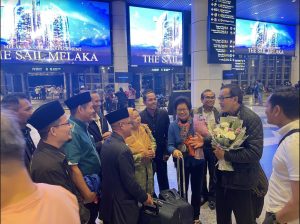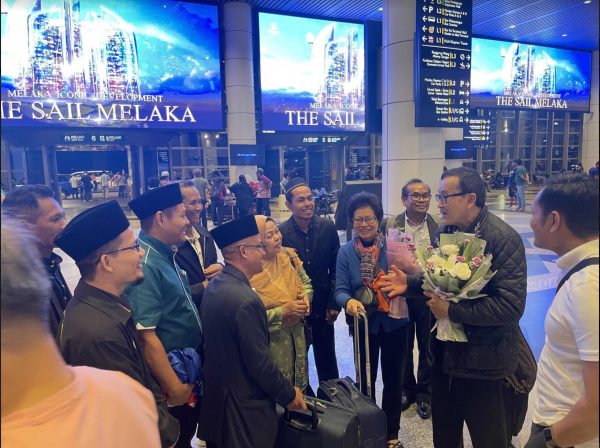
Exiled Cambodian opposition leader Sam Rainsy meets Cambodian Muslims in Kuala Lumpur, Malaysia, in a photo posted on his Facebook page on May 31, 2023.
Credit: Facebook/ Sam Rainsy
Malaysia’s government yesterday expelled a group of exiled Cambodian opposition politicians, amid an intensifying crackdown in Cambodia ahead of next month’s national election.
According to a report in the pro-government Khmer Times, Sam Rainsy and other leaders of the banned Cambodia National Rescue Party (CNRP) had traveled to Kuala Lumpur for a meeting, before Prime Minister Anwar Ibrahim ordered their expulsion after learning of their presence here this morning.
The paper quoted a speech by Prime Minister Hun Sen yesterday in which he claimed Anwar had promised him “four times” that Sam Rainsy would “never be allowed to step on Malaysian soil.” Hun Sen said that the Malaysian leader made the promise during his visit to Cambodia in March.
Referring to him as the “the three-generation traitor,” a reference to the political careers of Rainsy’s father Sam Sary and grandfather Sam Nhean, Hun Sen claimed that Sam Rainsy was only able to enter Malaysia because he tricked the authorities by traveling on his French passport.
Diplomat Brief
Weekly Newsletter
N
Get briefed on the story of the week, and developing stories to watch across the Asia-Pacific.
Get the Newsletter
“Now he is at the airport, getting ready to leave,” Hun Sen said of his long-time rival. “Yesterday, he was attempting to have a meeting in KL but was not allowed to.” The Cambodian leader claimed in his speech that the former CNRP leaders had “bragged” about traveling to Thailand, but warned that if they attempted to cross the frontier into Cambodia he would welcome them with BM-21 Grad rocket launchers.
While it is unclear whether Rainsy was actually making an attempt to reach Cambodia, where he faces decades of prison time on transparently political charges, he has on several occasions announced plans to return and lead an uprising against Hun Sen’s government. Most recently, in November 2019, Rainsy was blocked from boarding a flight from Paris to Bangkok, after the Cambodian government threatened legal action against any airline that permitted him to board a flight to Cambodia.
Yesterday’s expulsions come amid a broadening political crackdown inside Cambodia as the country moves toward national elections on July 23. Last month, the Candlelight Party (CLP), the latest iteration of a party founded by Sam Rainsy in 1998, was barred from participating in next month’s national election. Its leadership has faced the full spectrum of repression, from politically motivated legal cases and physical attacks to intense pressure to defect to Hun Sen’s ruling party. The Cambodian government also shuttered the Voice of Democracy, one of the few remaining independent media outlets in the country.
Shortly after departing the country, Sam Rainsy posted on his Twitter account photos purporting to show him meeting with members of Malaysia’s Parliament. Mu Sochua tweeted that he met with Wong Chen, a parliamentarian from Anwar’s People’s Justice Party. She added that he left the country yesterday on his own accord.
Advertisement
This is not the first time that Malaysia has expelled former members of the CNRP from the country. On the attempted return by CNRP figures in November 2019, the party’s deputy leader Mu Sochua was detained in Malaysia along with another party official and subsequently deported. Then-Prime Minister Mahathir Mohamad said that his government did “not want to let them use Malaysia as a base for struggle in other countries.”
Malaysia’s Foreign Ministry said late yesterday that Anwar did not know about Sam Rainsy’s arrival in the country. “With regard to the presence of the former Chief Opposition Member of Cambodia Sam Rainsy in Malaysia, the Ministry of Foreign Affairs wishes to reiterate that the prime minister, Datuk Seri Anwar Ibrahim, was not informed of his arrival to this country,” the ministry said in a terse statement. “Nonetheless, Sam Rainsy has left Malaysia this morning and no public program was held during his stay here.”
The ministry’s statement fails to clarify whether or not Sam Rainsy and his colleagues were forced to leave the country. It also stops short of a denial of Hun Sen’s claim that Anwar, who himself spent years in prison on politically motivated charges, had promised not to permit Cambodian opposition figures to travel to Malaysia.
If true, Anwar’s promise is obviously odds with his domestic tolerance of criticism from his opponents. In February, for instance, he said that students had “the freedom to criticize the prime minister, the government.”
However, it is clear that within the Association of Southeast Asian Nations (ASEAN), these freedoms, even for those few countries that permit them, stop abruptly at the water’s edge. Indeed, it could hardly be otherwise given the anti-communist and explicitly reactionary origins of ASEAN, which views concord among the region’s governments, especially in the thwarting of internal threats, as the supreme political principle.
